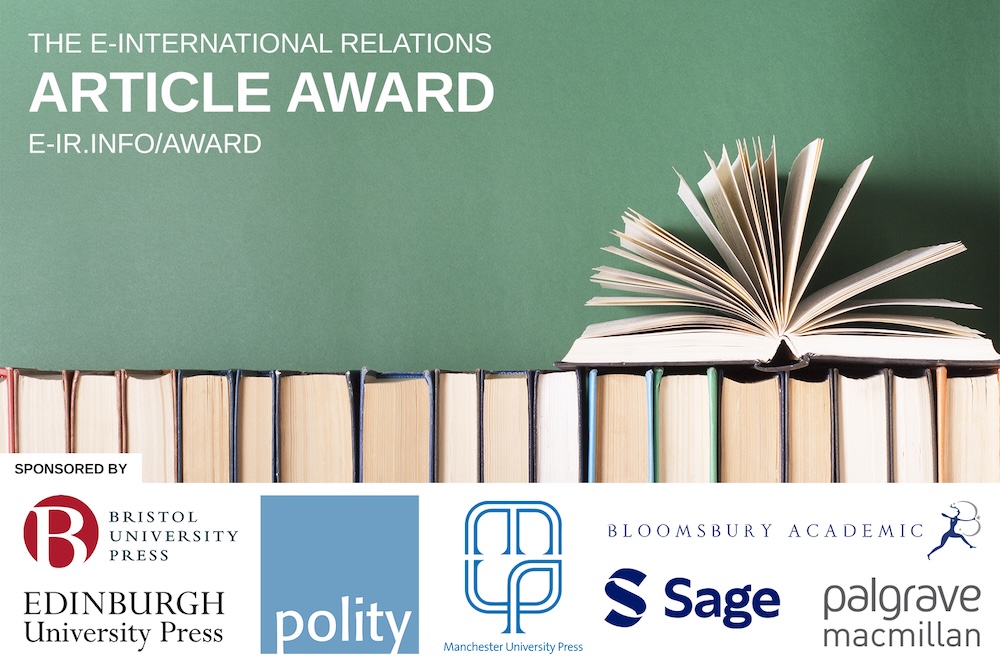The 2025 E-International Relations Article Award

We are proud to announce the winner of the 2025 award as The Ghost of Gandhi: A Hauntological Approach to Truth and Non-Violence by Astha Chadha.
*The 2026 run of the award will be announced in due course*
Each year, E-International Relations invites PhD / doctoral students (at any stage), research-track Masters students, and early career academics (within 5 years of submitting their PhD) to prepare articles outlining novel, or underappreciated, ideas that contribute to a better understanding of international relations. The award welcomes articles on the widest range of topics, so long as they connect their subject matter to a global or regional issue, with the aim of sparking debate that will contribute towards real-world outcomes. We welcome empirical, political, historical, legal and diplomatic approaches, as well as articles that discuss theoretical and disciplinary issues in an accessible way. As the purpose of this award is to communicate new ideas to the widest possible audience, entrants must avoid writing in an abstract or overly jargon-laden manner. Papers must be concise, written to engage any informed reader – including non-specialists. The criteria we have placed below will assist entrants in writing in a suitable way for the award.
Prize details
Shortlisted papers will be copy-edited and published on E-International Relations and promoted across all our social media channels to allow the ideas expressed to reach our audience of 3+ million readers. From the shortlisted candidates, one paper will be awarded and win book vouchers and digital subscriptions. The 2025 award came to the value of £1500, shared across our sponsors – Edinburgh University Press, Polity, Sage, Bloomsbury, Manchester University Press, Palgrave Macmillan and Bristol University Press.
Entry criteria
1) Applicants must be a single author who is enrolled as a PhD student/candidate (at any stage), on a research-track Masters, or be an early-career academic who has been awarded their PhD within the last 5 years (we can give or take a little here, so don’t worry too much if you are marginally outside this). We do not allow co-authored or group authored articles for this award.
2) Papers must be between 3500–5000 words, including references and citations. As references are included in the word count, keep referencing and quotation to a minimum and only cite where you are directly referring to essential literature/ideas.
3) You must write about a subject that you have academic insight on (due to your own primary research and/or data collection) and do so in a manner that allows your ideas to be understood by as wide an audience as possible.
4) If you are currently volunteering as an editor (any position) with E-International Relations, you are ineligible to enter this award.
5) You can make one entry for the award per year (do not send multiple articles) and the deadline and instructions for receipt of our next run of the award will be announced in Spring 2026.
You must format your article as follows
- Prepare your article in Microsoft Word format (.docx) in well written, well edited, publishable English (any variant is fine).
- Include a bio (20–100 words) that details academic/professional affiliations, titles, positions and preferred pronouns (as applicable). We are happy for you to include notable publications and web/social links.
- Shape a catchy title that directly describes the content. It must be 80 characters or less and in Title Case.
- Do not indent the first sentences of paragraphs. Leave one clear line of space between each paragraph.
- Referencing should be via embedded hyperlinks and/or the Chicago Manual of Style’s author-date system.
- We do not allow footnotes or endnotes in any form (for referencing, or otherwise).
- Your article must not exceed 5000 words, inclusive of references and citations.
- Indent quotes longer than two lines. Do not italicise quotations.
- Do not use a double space after each period / full stop (single space please).
- If you have used images, figures or tables, compile these at the bottom of your article and number them. If used, these must be integral to the content and be created/owned by you, or supplied with attribution and a destination link to the source confirming it is public domain.
*We are now closed for submissions. The 2026 run of the award will be announced in due course*
There are no charges, or any hidden costs, for any aspect of entering the award. Our Publishing Agreement is available here. Copyright remains with you, the author.